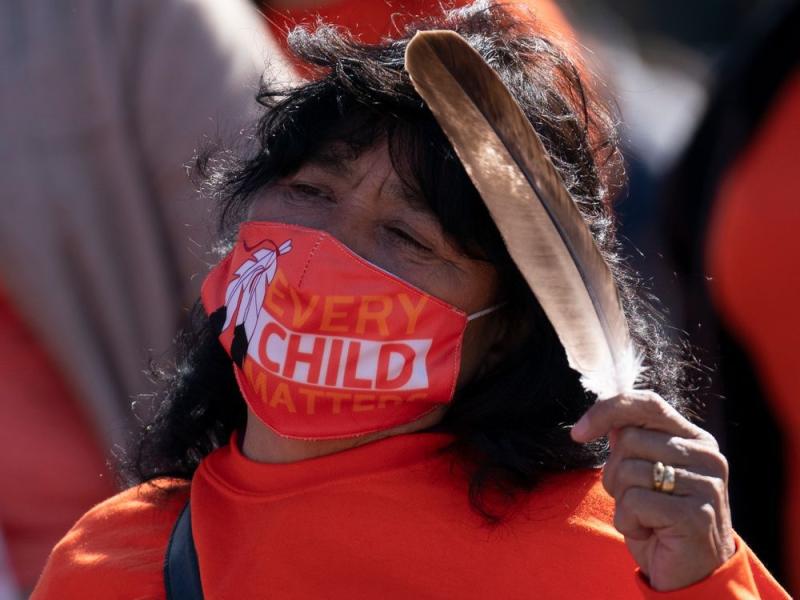Government announces $40-billion settlement over Indigenous child-welfare system | National Post
By: nationalpost



Author of the article: Ryan Tumilty Publishing date: Jan 04, 2022 • January 4, 2022 • 3 minute read • 478 Comments A woman holds an eagle feather as she listens to speakers during National Day for Truth and Reconciliation ceremonies on Parliament hill, Thursday, September 30, 2021 in OttawaPhoto by THE CANADIAN PRESS/Adrian Wyld
OTTAWA — The federal government has reached a $40-billion settlement with First Nations groups over the systemic underfunding of child welfare services that led to Indigenous children being removed from their families.
Story continues below This advertisement has not loaded yet, but your article continues below.
Half of the money will be going toward compensating an estimated 200,000 children who were either taken from their homes or denied medical services over the past three decades.
We apologize, but this video has failed to load. Try refreshing your browser, or
tap here to see other videos from our team.
The other half of the settlement will attempt to address the chronic underfunding of the system, with $20 billion over five years earmarked to improve services in Indigenous communities so children will no longer be removed from their homes.
Indigenous Crown Relations Minister Marc Miller said at a press conference Tuesday the money doesn't reverse the damage but is an acknowledgment that successive governments have failed Indigenous children.
"This is the largest settlement in Canadian history, but no amount of money can reverse the harms experienced by First Nations children," he said. "Historic injustices require historic reparations."
The settlement was reached after a Canadian Human Rights Tribunal awarded $40,000 to children who had been removed from their families through the Indigenous child welfare system.
The government initially appealed the ruling, arguing that the tribunal was operating beyond its mandate and that a one-size fits all approach, treating children the same if they were separated from their family for a night or for a decade, was unfair.
After losing an appeal late last year, the government opted to enter formal negotiations rather than take the tribunal's decision to the Supreme Court. The negotiations ended on New Year's Eve.
The settlement also addresses class-action lawsuits brought against the government for failing to adhere to a concept called Jordan's Principle.
The principle says provincial and federal officials should cover the cost for medical services for Indigenous children upfront and decide who is responsible for paying afterward. It is named after Jordan River Anderson, a Manitoba boy who died after spending two years in hospital because provincial and federal authorities could not agree on who should pay for his care at home.
Lawyers involved in the class-action suits estimate that 115,000 children, most of whom are now adults, were apprehended under the child welfare system and another 100,000, at least, were denied services because the government didn't follow Jordan's Principle.
Assembly of First Nations Regional Chief Cindy Woodhouse said the system was slanted toward removing kids from their families as the first resort instead of the last resort as it is in the non-Indigenous system.
"Every day for decades, First Nations have been ripped from their families and communities and many denied medical service and other supports," she said. "First Nations child welfare agencies would not receive funding unless the child was removed from their home and placed into foster care."
The compensation agreement covers people either removed from their homes or who did not receive adequate services between 1991 and 2007. The final details of how people will be compensated has not been set, but that process is expected to be completed by the end of March with the possibility of the first cheques going out as soon as April.
The Human Rights Tribunal can award a maximum of $40,000. Indigenous Relations Minister Patty Hajdu said she expects $40,000 will be the minimum people receive if they are eligible.
The settlement is much larger than what the government paid residential school survivors. Total compensation for that agreement reached $3.2 billion, but covered roughly 30,000 people. The average individual payout was just over $100,000.
Miller said the government is committed to reconciliation with Indigenous people and this is the cost.
"You can want reconciliation all you want, but it ain't free," Miller said. "There's a cost to it, but it's an important one. And in this case, it's an important step towards some sort of equality."
He highlighted the additional $20 billion to fix the system so another generation of Indigenous children isn't traumatized.
Hajdu said the new system will focus as much as possible on prevention, ensuring struggling families have the resources they need rather than removing children from their home.
"Poverty cannot be a reason that a child cannot stay with their family."
Woodhouse said she is hopeful the government is prepared to work with Indigenous communities and won't be imposing a solution on them.
"The solutions on many of these issues are right in our communities, with our elders, with our people, with our youth, with our leadership and with our people in our communities."
Twitter: RyanTumilty
Email: rtumilty@postmedia.com

Tags
Who is online
459 visitors


Trolling, taunting, and off-topic comments may be removed at the discretion of group mods. NT members that vote up their own comments or continue to disrupt the conversation risk having all of their comments deleted. please remember to quote the person(s) to whom you are replying to preserve the continuity of this seed.
Yes, that is $40 B as in billion.
Finally, after all these years and the pain, suffering, and deaths involved the end is here and the Canadian government has to pay the piper.
while I'm happy that justice has prevailed and first nation groups are finally being compensated, I'm sorry that those responsible will never face financial ruin for their past decisions.
Agreed.
I was thinking the same thing.
There are members here who deny it ever happened.
Sadly that is true or they will try to excuse or justify it.
They probably are Holocaust deniers also.
And people who say that we did not land on the moon
And that the earth is flat.
Sadly, if the church sez it's gonna do it - I don't believe it after all these years/contracts/meeting/edicts.
Show me the dough.
If it was the RCC I would totally agree but this is a final settlement with the Canadian government which had lost this case at every judicial level.
Maybe - just maybe this will come to fruition.
The National Post has been very informative
Barbara Kay: What we don't know about unmarked graves at residential schools | National Post
The graves were never a secret: Why so many residential school cemeteries remain unmarked | National Post
They even posted a story sort of supporting Professor Roulliards right to his opinions...
The Post usually gives all side print space.
I'm glad that my government has done the right thing, something that can make me proud to be a Canadian, because a number of things the Trudeau government has done (and not done what it SHOULD have done) have dismayed me. Will Americans be proud of their government if they were to follow suit and do the right thing? I personally doubt that it would pass the Senate.
Many of us would be.
Yes, there are many that would be, which is encouraging.
They did do the right thing finally.
I doubt if the US will/would ever do something like this unless forced by every level of judicial power. Do the right thing doesn't seem to be the guiding principle to many.
Seriously, not wanting to be negative, but - 376 broken treaties??? Not much of a guiding principle.
That was my point, ''doing the right thing'' doesn't seem to be the guiding principle to many.
We just crested the dreaded $30Trillion national debt line.
So many excuses...
All I can say is it's about time and this will make a big difference to a new generation of indigenous children and their families.
Yes, it will, and hopefully, the victims will have some relief from their horrors that they endured for many years.
Thank you, Canada, for recognizing the wrongs.
Yes, definitely.
You done good, Canada. Maybe your neighbor to the south will follow your example
One can hope, Trout.
Somehow it seems bitter sweet. Yes the Canadian government did the right thing yet it seems the RCC still gets off.
Oh yeah, the RCC in Canada owes the First Nations millions. It will never be paid.
I figured Canada would end up ponying up, but I doubt we'll see the same here in the States.
I agree with that, EG.
I doubt it also.
I have always found the treatment of IP appalling. Taking away their children is atrocious & someone should be held responsible for this atrocity.
I mean come on - if removing children from homes is based on "poverty" why do so many WTT get to keep their 14 kids in their 2 bedroom trailer?
It happened in Canada for decades and in the US for decades. The Indian child welfare act of 1978 in the US stopped some of it but it has no real teeth if the states decide not to follow it.
This shit makes sick & feeling shamed. Yes, shame. BECAUSE we as a people should know better.